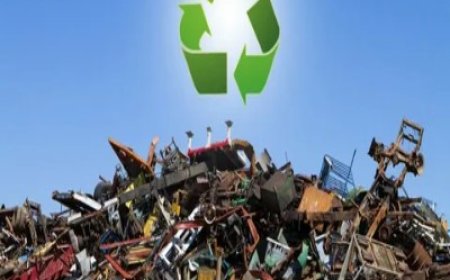Record Storage Regulations & GDPR: What Every UK Business Needs to Know
Learn how Record Storage Regulations & GDPR impact UK businesses. Stay compliant with secure document storage solutions from Paper Escape.

With data breaches on the rise and privacy laws becoming more stringent, businesses in the UK must understand and comply with Record Storage Regulations & GDPR. Failure to do so can result in serious penalties, reputational damage, and operational disruptions. Whether you're a small business owner or part of a larger organisation, secure and compliant record storage is not just a best practiceits a legal obligation.
In this blog, we explore what Record Storage Regulations & GDPR mean, how they apply to physical document storage, and how Paper Escape can help your business remain compliant while optimising efficiency.
Understanding the Importance of Record Storage Regulations & GDPR
The General Data Protection Regulation (GDPR), introduced in 2018 and enforced by the Information Commissioner's Office (ICO) in the UK, governs how personal data is collected, stored, and processed. While often associated with digital data, GDPR also applies to physical documentscontracts, invoices, personnel files, and morethat contain personal or sensitive information.
Record Storage Regulations & GDPR require businesses to:
-
Store personal data securely
-
Restrict access to authorised personnel
-
Retain records only as long as necessary
-
Dispose of them securely when no longer required
These requirements mean your paper records must be stored with the same level of care and confidentiality as your digital files.
Key Principles of GDPR and Their Impact on Record Storage
Lets break down how the core principles of GDPR influence how you manage physical documents:
1. Lawfulness, Fairness, and Transparency
You must have a legitimate reason to collect and retain records. Transparency about why youre storing data and for how long is essential.
2. Data Minimisation
Only the necessary documents should be kept. Hoarding records increases risk and violates GDPR principles.
3. Storage Limitation
GDPR mandates that personal data should not be kept longer than necessary. This means implementing a records retention policy is essential.
4. Integrity and Confidentiality
Paper records must be stored in secure environmentslocked cabinets, controlled storage rooms, or better yet, dedicated offsite storage facilities with high security.
Legal Record Retention Requirements in the UK
Besides GDPR, several UK laws and industry regulations specify how long different types of records must be retained. For example:
-
Financial Records: Must be retained for at least six years under the Companies Act 2006 and HMRC guidelines.
-
Employee Records: Vary by document type, but generally must be kept for six years post-employment.
-
Health & Safety Records: Up to 40 years in certain cases (e.g., hazardous material exposure).
These record storage regulations & GDPR requirements can be complex to manage in-house, especially for businesses with limited space or resources. Thats where professional storage solutions come in.
Why Offsite Document Storage is Key to Compliance
Managing sensitive paper documents internally exposes businesses to several risks: loss, damage, theft, or non-compliance due to poor tracking. Offsite storage with a trusted partner like Paper Escape ensures:
-
Secure facilities with 24/7 surveillance and restricted access
-
Barcoded tracking systems for efficient retrieval
-
Retention scheduling so you know when to destroy or archive documents
-
GDPR-compliant destruction services, including confidential shredding
With over 20 years of experience in secure document storage and data protection, Paper Escape helps businesses across the UK stay compliant with Record Storage Regulations & GDPR while saving time and reducing costs.
GDPR-Compliant Document Destruction
Once your records have reached the end of their retention period, secure destruction is mandatory under GDPR. Simply throwing documents in the bin or recycling them isnt enough and can lead to data breaches.
At Paper Escape, we offer:
-
Certified confidential shredding
-
Waste transfer notes for audit trails
-
Certificates of destruction for compliance records
This process ensures that your business not only meets the Record Storage Regulations & GDPR but also demonstrates accountability in the event of an ICO investigation.
Best Practices for GDPR-Compliant Record Management
To simplify compliance, here are some practical steps your business can take:
-
Audit Your Documents: Identify what you have, where it is, and whether its still needed.
-
Define Retention Periods: Use legal guidelines to set retention schedules.
-
Store Safely: Use offsite secure storage for sensitive or long-term documents.
-
Limit Access: Make sure only authorised individuals can access records.
-
Monitor and Review: Regularly review stored documents and destroy those no longer required.
How Paper Escape Supports Your Compliance Journey
At Paper Escape, we provide end-to-end document storage and management solutions designed around Record Storage Regulations & GDPR compliance. Whether you need to store HR files, financial records, medical documents, or legal papers, we offer:
-
Secure document collection and storage
-
Real-time retrieval services
-
Retention and destruction scheduling
-
Compliance consultation and support
With services tailored to businesses of all sizes, Paper Escape makes managing physical documents stress-free and regulation-compliant.
Final Thoughts
The pressure to comply with Record Storage Regulations & GDPR can be daunting, especially with evolving legal requirements. But with the right systems in placeand a reliable partner like Paper Escapeyou can protect your data, avoid fines, and stay focused on what you do best.









































